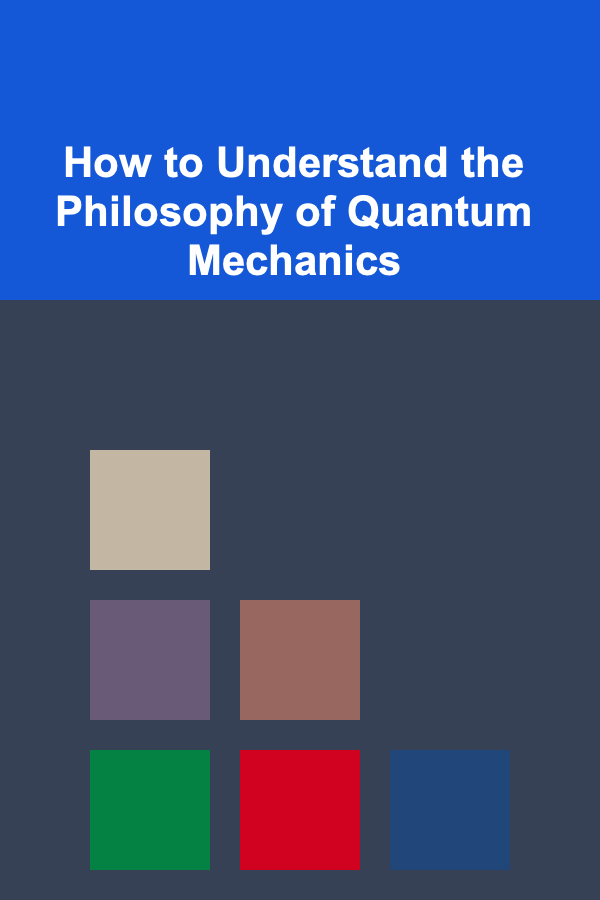
How to Understand the Philosophy of Quantum Mechanics
ebook include PDF & Audio bundle (Micro Guide)
$12.99$5.99
Limited Time Offer! Order within the next:

Quantum mechanics, often considered one of the most successful theories in the history of science, revolutionized our understanding of the universe at the most fundamental level. However, alongside its astounding predictive power and practical applications, quantum mechanics also presents some of the most profound and perplexing philosophical questions. In this article, we will explore these philosophical questions, providing a deeper understanding of quantum mechanics' implications for reality, knowledge, and the very nature of existence.
The Origins of Quantum Mechanics and Its Philosophical Foundations
Quantum mechanics emerged at the turn of the 20th century, with key contributions from scientists such as Max Planck, Albert Einstein, Niels Bohr, Werner Heisenberg, and Erwin Schrödinger. These developments arose in response to experimental results that could not be explained by classical physics. Phenomena such as blackbody radiation, the photoelectric effect, and the discrete nature of atomic energy levels led scientists to propose a new way of understanding the behavior of matter and energy at microscopic scales.
At its core, quantum mechanics deals with the behavior of particles, such as electrons and photons, that do not follow the deterministic laws of classical physics. Instead, these particles exhibit behaviors that are probabilistic in nature. This departure from classical determinism raises a variety of philosophical questions about the nature of reality, causality, and the limits of human knowledge.
The Copenhagen Interpretation: Wave-Particle Duality and Observer Effect
One of the earliest and most influential interpretations of quantum mechanics is the Copenhagen Interpretation, largely developed by Niels Bohr and Werner Heisenberg. According to this view, quantum particles, such as electrons, do not have definite properties---such as position or momentum---until they are measured. Before measurement, the particle exists in a superposition of all possible states, described by a wave function. The wave function gives the probability of finding the particle in a particular state upon measurement, but it does not describe a definite, real state until observed.
This concept, often referred to as "wave-particle duality," holds that quantum objects behave as both particles and waves, depending on how they are measured. The famous double-slit experiment demonstrates this duality. When not observed, particles such as electrons or photons behave like waves, creating an interference pattern that suggests they pass through both slits simultaneously. However, when observed, they behave like particles, only passing through one slit, and the interference pattern disappears.
The philosophical implications of this interpretation are profound. It suggests that the act of observation or measurement plays a critical role in shaping reality itself. Before an observation, the quantum system exists in a superposition of states, and only when measured does it "collapse" into a specific state. This challenges our classical notions of objective reality, where things exist independently of our perception of them.
The Observer Effect
The observer effect is a central feature of the Copenhagen Interpretation. It suggests that the very act of observing a quantum system influences its state. This has led to a fundamental question in the philosophy of quantum mechanics: Does reality exist independently of observation, or does the act of measurement somehow create or determine reality?
Philosophers and physicists have debated this issue for decades. Some argue that reality is independent of observation, and the wave function collapse is merely a reflection of our lack of knowledge about the system. Others, like Bohr, suggested that observation is an intrinsic part of the process that defines the properties of quantum systems.
The notion that the observer affects the system challenges our classical understanding of a "hidden" objective reality that exists regardless of whether we observe it. If reality only comes into being when observed, it raises the question of whether reality is subjective or objective.
Many-Worlds Interpretation: A Branching Multiverse
An alternative to the Copenhagen Interpretation is the Many-Worlds Interpretation (MWI), proposed by Hugh Everett in 1957. According to MWI, when a quantum system is observed, rather than collapsing into a single state, the universe "splits" into multiple, non-interacting branches. Each possible outcome of the measurement corresponds to a different branch of the universe, with each branch containing a version of the observer who experiences a particular outcome.
The Many-Worlds Interpretation eliminates the need for wave function collapse, proposing instead that all possible outcomes of quantum measurements occur, but in separate, parallel universes. This leads to the idea of a multiverse---a collection of infinite, parallel universes where all possible quantum events are realized.
From a philosophical standpoint, MWI raises several intriguing questions about the nature of existence. If every quantum measurement results in the creation of a new universe, does this imply an infinite number of parallel realities, each with its own version of you and me? Does this idea challenge our understanding of free will, as every decision we make could give rise to multiple outcomes, each realized in a different branch of the universe?
Furthermore, the concept of an infinite number of unobservable universes challenges our notions of empirical evidence. If these other universes are forever beyond our reach, how can we make sense of a theory that relies on entities we cannot observe?
The Role of Probability and Determinism in Quantum Mechanics
One of the most striking features of quantum mechanics is its probabilistic nature. Unlike classical mechanics, which is deterministic (given the initial conditions, the future state of a system is predictable), quantum mechanics is fundamentally probabilistic. The wave function of a quantum system provides the probabilities of different outcomes, but it cannot predict with certainty what will happen in any particular instance.
This probabilistic framework is encapsulated in the famous Heisenberg Uncertainty Principle, which states that certain pairs of physical properties, such as position and momentum, cannot be simultaneously known to arbitrary precision. This uncertainty is not a limitation of our measuring instruments, but a fundamental feature of nature itself.
Philosophically, the probabilistic nature of quantum mechanics challenges the deterministic view of the universe that dominated classical physics. If the future is inherently uncertain, how can we make sense of the concept of causality? Does this imply that the universe is indeterministic, and if so, what does that mean for the notion of free will?
Moreover, quantum mechanics raises the issue of realism versus anti-realism. Realism is the belief that physical objects have objective properties, independent of observation. Anti-realism, on the other hand, suggests that physical reality is dependent on observation or measurement. Quantum mechanics seems to blur the line between these views, as the properties of quantum systems appear to exist only when measured, leading some philosophers to question the very nature of reality.
The Philosophical Impact on Our Understanding of Reality
The philosophical implications of quantum mechanics extend beyond technicalities about wave functions and measurement theory. At a more fundamental level, quantum mechanics forces us to reconsider our understanding of reality itself. What does it mean for something to "exist"? Is reality independent of our perception, or does our observation play an essential role in shaping it?
One key aspect of this debate is the concept of "reality" as it pertains to quantum mechanics. In classical physics, reality is typically seen as a well-defined, objective thing that exists independently of the observer. However, in quantum mechanics, reality becomes more elusive and probabilistic. This raises the possibility that the universe is not a set of deterministic, objective truths, but rather a web of probabilities that depend on observation and interaction.
Quantum mechanics also challenges our understanding of time and space. In classical mechanics, time is an unchanging, continuous background against which events occur. But in quantum mechanics, time becomes more fluid, and concepts like "simultaneity" and "causality" can no longer be taken for granted in the same way. This has profound philosophical implications for how we think about the flow of time, the nature of cause and effect, and even the possibility of time travel.
The Limits of Human Knowledge
Finally, quantum mechanics raises important questions about the limits of human knowledge. Can we ever truly understand the nature of reality, or are we forever constrained by the limitations of our perception and measurement? The wave function, for instance, is a mathematical abstraction that allows us to predict the probabilities of different outcomes, but it is not something we can directly observe or experience. Does this mean that our knowledge of the universe is inherently incomplete?
Moreover, the probabilistic nature of quantum mechanics suggests that some aspects of reality may forever remain unknowable. If certain properties of quantum systems only exist as probabilities, and are only realized upon measurement, can we ever fully understand the true nature of those systems? Are there limits to what we can know about the universe, no matter how advanced our technology becomes?
Conclusion: Quantum Mechanics and the Philosophy of Reality
Quantum mechanics is not just a scientific theory; it is also a philosophical exploration of the nature of reality, knowledge, and existence. The many interpretations of quantum mechanics, from the Copenhagen Interpretation to the Many-Worlds Interpretation, provide different ways of thinking about the role of the observer, the nature of reality, and the limits of knowledge.
The philosophical questions raised by quantum mechanics are not merely academic; they challenge our fundamental assumptions about the world we live in. They force us to reconsider what it means for something to be real, to exist, and to be knowable. In doing so, quantum mechanics opens up new avenues for thinking about the universe and our place within it. Whether or not we ever fully resolve these philosophical questions, the journey into the heart of quantum mechanics is sure to continue to provoke deep reflection about the nature of reality and our understanding of it.

How to Create an Organized Outdoor Living Area
Read More
How to Keep Your Home's Bathroom Fixtures in Great Condition
Read More
How to Use Blockchain for Decentralized Cloud Computing
Read More
How To Simplify Your Kids' Toys and Belongings
Read More
How to Hydrate Oily Skin Without Clogging Pores
Read More
Using Technology for Wildlife Protection
Read MoreOther Products

How to Create an Organized Outdoor Living Area
Read More
How to Keep Your Home's Bathroom Fixtures in Great Condition
Read More
How to Use Blockchain for Decentralized Cloud Computing
Read More
How To Simplify Your Kids' Toys and Belongings
Read More
How to Hydrate Oily Skin Without Clogging Pores
Read More